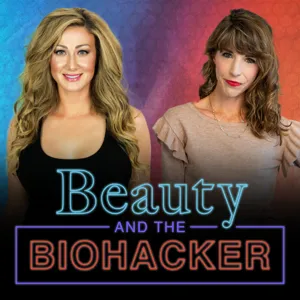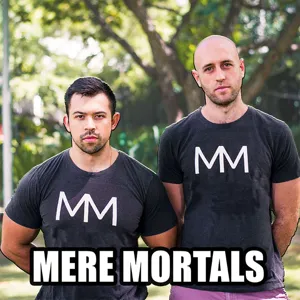Podcast Summary
The Profound Power of Beauty in Inspiring Change and Challenging Our Understanding of Art and the Human Experience: Beauty has the ability to ignite global movements, enhance artistic talent, and provide insights into the universe and personal growth.
The power of beauty is profound and influential. The iconic photograph of Earthrise taken by the Apollo eight astronauts not only captured a stunning image but also sparked a global movement for environmental protection. This demonstrates how beauty can inspire action and change. Furthermore, neuroscientist Anjan Chatterjee's exploration of aesthetics revealed the impact of brain damage on artistic abilities. In some cases, individuals with neurological deficits showed enhanced artistic talent. This paradox challenges our understanding of art and suggests that beauty is deeply rooted in the human experience. Ultimately, the study of beauty and its effects on the mind can provide insights into both the secrets of the universe and the potential for personal growth and transformation.
The Impact of Neurological Conditions on Artistic Abilities: Neurological conditions such as frontotemporal dementia, autism, Parkinson's disease, and strokes can affect artistic skills and expression, highlighting the connection between art and specific brain regions and neurotransmitters. This understanding may offer therapeutic benefits in neurodegenerative conditions.
Certain neurological conditions can have profound effects on artistic abilities and the way art is produced. For example, in frontotemporal dementia, autism, and Parkinson's disease, individuals may experience heightened graphic skills or a strong compulsion to create art. The use of dopamine agonists in Parkinson's patients can also intensify the urgency and motivation to engage in artistic activities. Additionally, strokes can lead to shifts in artistic style and expression, as seen in the case of Catherine Sherwood. These findings suggest that art production is intricately connected to the functioning of specific brain regions and neurotransmitters. Understanding these connections can shed light on the nature of art and provide insights into the potential therapeutic benefits of artistic expression in neurodegenerative conditions.
The Diverse Nature of Art and the Role of the Human Brain in Aesthetic Experience: Art is a multifaceted concept, with different artists bringing their unique approaches. Our brains are naturally inclined towards aesthetics, even when not consciously focused on it.
Art is not a homogenous concept, but rather encompasses a wide range of representations and communication styles. Different artists, such as Mark Rothko, Rembrandt, and El Greco, approach art in unique ways, highlighting the diverse nature of artistic expression. Additionally, the human brain plays a significant role in experiencing and appreciating art, with aesthetic judgments activating specific regions of the brain. Research has shown that attractive faces, for example, elicit increased neural activity in the visual cortex. This suggests that our brains are inherently attuned to aesthetics, even when aesthetics is not the primary focus. Ultimately, the human brain's fascination with aesthetics remains a captivating and intriguing question.
The Universal Attraction to Beauty: An Inherent Response in Human Beings: Our preference for beauty in others is not solely influenced by society or media; it is wired into our brains from an early age and may serve an evolutionary purpose in selecting optimal partners for procreation.
Our perception of beauty is ingrained in us from a very early age and seems to be a universal response across cultures. This suggests that our attraction to certain features is not solely influenced by societal standards or media influences. Even infants, as young as six months, show a preference for faces that adults find attractive. This indicates that our brains are inherently wired to respond to beauty. It is believed that our preference for beauty in others is linked to indicators of health, as these traits have historically led to better chances of survival and reproduction. Our capacity to appreciate beauty may serve an evolutionary purpose in selecting optimal partners for procreation.
The link between physical attractiveness and health: Our preference for attractiveness may stem from traits that historically indicated good health and genetic diversity, helping individuals with these traits to survive and pass them on.
Physical attractiveness is often associated with signs of health and genetic diversity. The preference for symmetry in faces is believed to signal good immune competence, as infectious causes historically tended to be disfiguring. Likewise, the attractiveness of averaged faces suggests a greater genetic mix and a stronger immune system. However, it's important to note that individuals are not consciously assessing someone's health when they find them attractive. These traits that we find appealing likely evolved because the hypothetical groups of people who found them attractive were more likely to survive over time. This concept can also be extended to the appreciation of art and architecture, where our cultural backgrounds and personal histories shape our aesthetic experiences.
The Beauty of Artistic Expression and Skilled Movement in Various Fields: Our brains find pleasure and joy in understanding and making sense of artistic expression and skilled movement, whether it is in physical performances or in the realms of mathematics, chess strategies, and scientific equations.
Artistic expression and skilled movement that evoke emotions and meaning in our brains can be incredibly beautiful and captivating. Watching a graceful dancer, an athlete defying gravity, or the world's best soccer players score impossible goals can inspire a sense of wonder and awe. This beauty is not limited to physical performances, but can also be found in mathematics, chess strategies, and scientific equations. The aesthetics in these fields stem from the coherence and meaning they provide in the midst of chaos. Our brains find pleasure and joy in understanding and making sense of these concepts, just like how infants light up with joy when they grasp something.
The Evolutionary Connection between Beauty, Meaning, and Survival: Our appreciation for beauty and search for meaning is not random, but rather a result of our evolutionary need for survival and reproduction. The connection between science and aesthetics highlights our ability to find order and understanding in the universe.
Our ability to appreciate beauty and find meaning in the world is not just a random and subjective experience. It is actually a result of our evolutionary need for survival and reproduction. Our brains have been shaped by evolution to derive pleasure from activities that are useful for our survival, such as understanding complex phenomena and making predictions. The connection between science and aesthetics is also intriguing, as it reveals the profound ability of humans to find order and meaning in the universe. The fact that we can use mathematical equations to explain distant celestial bodies shows the miraculous ability of the scientific revolution to provide a precise mapping between concepts and reality. This understanding should drive us to seek a profound understanding of the world around us.
The Role of Simplicity and Beauty in Scientific Truth: Embracing simplicity and elegance in scientific explanations helps scientists choose the most plausible theories and uncover deep truths about the universe.
In the search for scientific truth, simplicity and beauty play a significant role. When faced with limited experimental data and numerous possible theories, scientists often turn to aesthetically pleasing or elegant explanations. This preference for simplicity guides their decision-making process and helps them choose the most plausible theories. A prime example of this is Einstein's special theory of relativity, with the iconic equation E=mc^2. Despite limited supporting data at the time, Einstein's belief in the elegance of this equation led to a breakthrough in our understanding of mass and energy. Similarly, in the field of particle physics, the pursuit of beautiful equations has helped unravel the mysterious forces that hold atoms and their components together. By valuing simplicity and elegance, scientists have been able to uncover deep truths about the universe.
The Beauty of Mathematics and Physics in Understanding the Quantum World: The discovery of quantum electrodynamics through the application of symmetry and efficiency in mathematical equations revolutionized our understanding of the atomic world, highlighting the power of beauty in science.
The discovery of quantum electrodynamics and the success of the equations in predicting the behavior of subatomic particles was a great success story in physics. Despite limited data and skepticism, the breakthrough led to a clearer understanding of atoms and the confirmation of predicted properties. Mathematical beauty played a crucial role in the discovery, as the equations were guided by symmetry and efficiency. The concept of symmetry, defined as a change that doesn't alter the whole, allowed for the application of symmetry to both shapes and equations. Efficiency, on the other hand, emphasized the ability of a compact set of principles to explain and produce a vast amount of outcomes. This beauty in mathematics and physics not only enhances our understanding but also empowers us to accomplish things previously unimaginable. The connection between beauty and truth still remains a thought-provoking question.
The Evolutionary Drive for Beauty and Understanding: Our appreciation for beauty is rooted in our desire to comprehend and interact with the world, and understanding the mysteries of the universe can provide solace in times of distress.
Our appreciation for beauty might be rooted in our evolutionary drive to understand and survive in the world. Beauty is a human concept that can be defined in different ways, but it often involves our desire to interact with and comprehend our surroundings. As sense-making creatures, we naturally impose structure on the world and seek deeper understanding. It's not a coincidence that we find it beautiful to have explanations of how the world works. This drive to understand and uncover the mysteries of the universe is what has allowed us to thrive as a species. So, when we encounter moments of pain or distress, remembering the beauty and comprehensibility of the world can provide solace and perspective.




